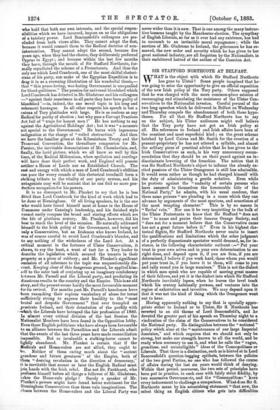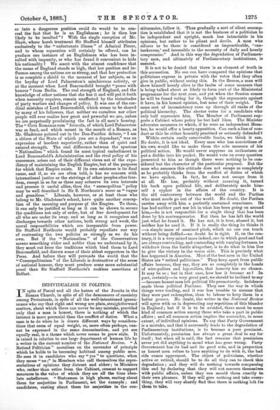SIR STAFFORD NORTHCOTE AT BELFAST.
WHAT is the object with which Sir Stafford Northcote has gone to Ulster? Some people imagined that he- was going to seize the opportunity to give an official exposition of the new Irish policy of the Tory party. Others supposed that he was charged with the more common-place mission of encouraging and stimulating the resistance of the Ulster Con- servatives to the Nationalist invasion. Careful perusal of the two long speeches which he delivered in Belfast on Wednesday and Thursday compels the abandonment of both these hypo- theses. For all that Sir Stafford Northcote has to say on the subject, his Ulster audiences might well believe that the Tory party have not got an Irish policy at all. His references to Ireland and Irish affairs have been of the scantiest and most superficial kind ; on the great scheme hatched by Lord Cairns and Mr. Smith for the creation of a peasant-proprietary he has not uttered a syllable, and almost the solitary piece of practical advice that he has given to the Irish Conservatives as such, is his very unnecessary recom- mendation that they should be on their guard against an in- discriminate lowering of the franchise. The notion that it was Sir Stafford Northcote's object to inflame the already ex- cited passions of the Ulster Orangemen is still less admissible. It would seem rather as though he had charged himself with the duty of administering a gentle sedative. Even while he protests against the "audacity of certain persons who have assumed to themselves the honourable title of the National Party," he admits, with his usual candour, that these same persons "are pleading in a cause which they can advance by arguments of the most specious, and sometimes of the most tempting character." This is by no means in "Braes' vein." Nor can it be very inspiriting to the bulk of the Ulster Protestants to know that Sir Stafford "does not fear" to name and praise their famous Orange Society, and "does not for a moment believe that the Conservative cause has not a great future before it." Even in his highest rhe- torical flights, Sir Stafford Northcote never omits to insert the qualifications and limitations which the sober judgment of a perfectly dispassionate spectator would demand, as, for in- stance, in the following characteristic outburst :—" Put your trust in your own selves and in your own determination to see right done, and depend upon it, if you are firm, if you are determined, I believe if you work hard, those whom you would put your trust in, if you leave it to them, will come to you and rally round you in large numbers." This is not the dialect in which men speak who are capable of moving great masses of their fellows, and yet it is the dialect into which Sir Stafford Northcote inevitably lapses, when he leaves the level track which his oratory habitually pursues, and ventures into the region of exhortation and invective. We may depend upon it that it was not the kind of thing which the Orangemen went out to hear.
Having apparently nothing to say that is specially appro- priate either to Ireland or to Ulster, Sir S. Northcote has reverted to an old theme of Lord Beaconsfield's, and he devoted the greater part of his speech on Thursday night to a vindication of the claim of the Conservatives to be considered the National party. He distinguishes between the " national " policy which aims at the "maintenance of our large Imperial dominion," and which requires that we should not only be strong, but make our strength known to all the world, and be ready when necessary to use it, and what he calls the "vague, grandiose, and unintelligible" ideas of the Cosmopolitans or Liberals. That there is a distinction, such as is hinted at in Lord Beaconsfield's question-begging epithets, between the policies of the two great Parties, no one who has followed the course of affairs during the last six years would think of denying. Within that period, moreover, the two sets of principles have been put in practice, in each case with fairly strict fidelity, by two successive Governmeats, and the " Cosmopolitans " have every inducement to challenge a comparison. What does Sir S. Northcote mean by his astonishing statement "that now, the safest thing an English citizen who gets into difficulties or into a dangerous position could do would be to con- ceal the fact that he is an Englishman ; he is then less likely to be insulted"? With the single exception of Mr. Shaw, whose harsh treatment Sir Stafford himself attributes exclusively to the "unfortunate illness" of Admiral Pierre, and to whom reparation will certainly be offered, can he produce one instance of an Englishman who has been in- sulted with impunity, or who has found it convenient to hide his nationality ? We assert with the utmost confidence that the name of England stands as high, that her position and in- fluence among the nations are as strong, and that her protection is as complete a shield to the meanest of her subjects, as in the heyday of Lord Palmerston's mischievous activity, or at the moment when Lord Beaconsfield brought "peace with honour" from Berlin. The real strength of England, and the knowledge of other nations that she has it and will put it forth when necessity requires, remain unaffected by the vicissitudes of party warfare and changes of policy. It was one of the car- dinal mistakes of Lord Beaconsfield, which seems to be shared by many of his followers, that neither we ourselves nor other people will ever realise how great and powerful we are, unless we are perpetually proclaiming the fact in all men's hearing. The" Civis Romanus sum" formula, of which Lord Palmerston was so fond, and which meant in the mouth of a Roman, as Mr. Gladstone pointed out in the Don-Pacifico debate, "I am a citizen of the State of which you are a dependant," was an expression of insolent superiority, rather than of quiet and assured strength. The real difference between the spurious " Nationalism " which found its most typical embodiment in Lord Beaconsfield's Administration and the rival policy of his successors, arises out of their different views not of the expe- diency of maintaining the English Empire, but of the purposes for which that Empire exists. If its own existenee is its final cause, and if, as we are often told, is has no concern with international justice or the strivings of other peoples after free- dom, except in so far as these may subserve its own interests and procure it useful allies, then the "cosmopolitan " policy may be well described in Sir S. Northcote's sneer as " vague and grandiose." Liberals, however, or at least those who belong to Mr. Gladstone's school, have quite another concep- tion of the meaning and purpose pf the Empire. To them, it can only be justified so long as it can be shown to secure the conditions not only of order, but of free development for all who are under its sway, and so long as it recognises and discharges towards other nations, both strong and weak, the moral responsibilities which are inseparable from power. Sir Stafford Northcote would probably repudiate our way of contrasting the two policies as strongly as we do his own. But if the ." Nationalism" of the Conservatives means something wider and nobler than we understand by it, they must cut loose the traditions which bind them to Lord Beaconsfield, and disown some of their ablest supporters in the Press. And before they will persuade the world that the "Cosmopolitanism" of the Liberals is destructive of the sense of national honour, they must produce some more substantial proof than Sir Stafford Northcote's reckless assertions at Belfast.



































 Previous page
Previous page